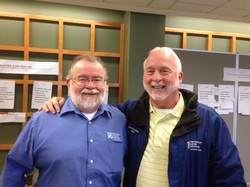In 1984, John Robinson was a community minister in North Carolina working with refugee resettlement. But something happened that year that changed the course of his ministry. A historic outbreak of tornadoes took Robinson down a path he couldn’t have expected.
“Let’s just say disaster chose me,” said Robinson. “A series of tornadoes tore across the state, cutting a path of destruction three miles wide. More than 1,500 homes simply disappeared in our area.”
In all, 24 tornadoes swept across the Carolinas that day, leaving 57 dead and more than 1,200 injured according to the National Weather Service. Robinson quickly found himself in the thick of recovery operations, working side-by-side with the Red Cross and other groups to connect with the people who needed help.
“I met with the Red Cross and offered them a 6,500 square foot manufacturing facility with phones, fax machines and conference rooms, everything they could need,” he said. “I had been in the community long enough to build a level of trust and we got the job done.”
Over a three and a half year period, the team of volunteers rebuilt 36 homes and completed more than 150 major restorations. Robinson said it was a joint collaboration between Presbyterians, Methodists, Lutherans and other organizations.
The next year, Robinson became one of the first volunteers under the former Presbyterian Disaster Assistance Team (PDAT.) Over the next 10 years, he would assist in a number of national disasters.
Then came a storm called Katrina. Robinson was serving as the interim associate in charge of disaster response when the historic hurricane ravaged New Orleans.
“The damage from Katrina stretched from Texas to Florida, about the size of Great Britain, and we had about 20 people on the ground to assist,” he said. “Some stayed for months and it was a very difficult time for the group.”
Out of needs discovered following Hurricane Katrina, the National Response Team was born. Robinson and Presbyterian Disaster Assistance (PDA) leaders worked to recruit and build a team of volunteers who could respond at a moment’s notice. Robinson is particularly proud of the team’s development over the last nine years, saying volunteers, retired workers, pastors and others are passionate about the work they do.
“Our capacity to handle disaster has increased five-fold,” he said. “There’s hardly a time or place we can’t put volunteers when needed to help presbyteries assess a situation and connect to a larger disaster response because our people know the Red Cross and FEMA and know how to connect the right dots.”
People don’t have to have disaster experience when coming into this program says Robinson. But they have to be open to God’s call to serve others and work with a team.
Of all of the disasters and emergencies Robinson has been involved with, a few stand out, including Katrina. He says Hurricane Sandy proved to be one of the best organized responses, pre-deploying a dozen people who were ready to move in quickly after the storm hit. The Oso, Wash., mudslide in 2014 left 43 dead and millions of dollars in damage. But Robinson said the disaster helped everyone understand how PDA can partner with civil authorities and do things other organizations could not.
The program won’t skip a beat as Robinson steps down. Rick Turner, an associate with disaster response has been working alongside Robinson for years and is taking on the newly vacated role.
“John’s experience, knowledge and tireless work have made PDA one of the best disaster response organizations in the country and he will be missed,” said Turner. “The good news is that John trained hundreds of volunteers, including me, who can, working together, keep up the good works of PDA.”
Robinson offers some parting advice for Turner, “When you ask someone to volunteer in this kind of work, you become responsible for them. Your phone must be working 24/7 to ensure your volunteers get the care and support they need to do their job.”

